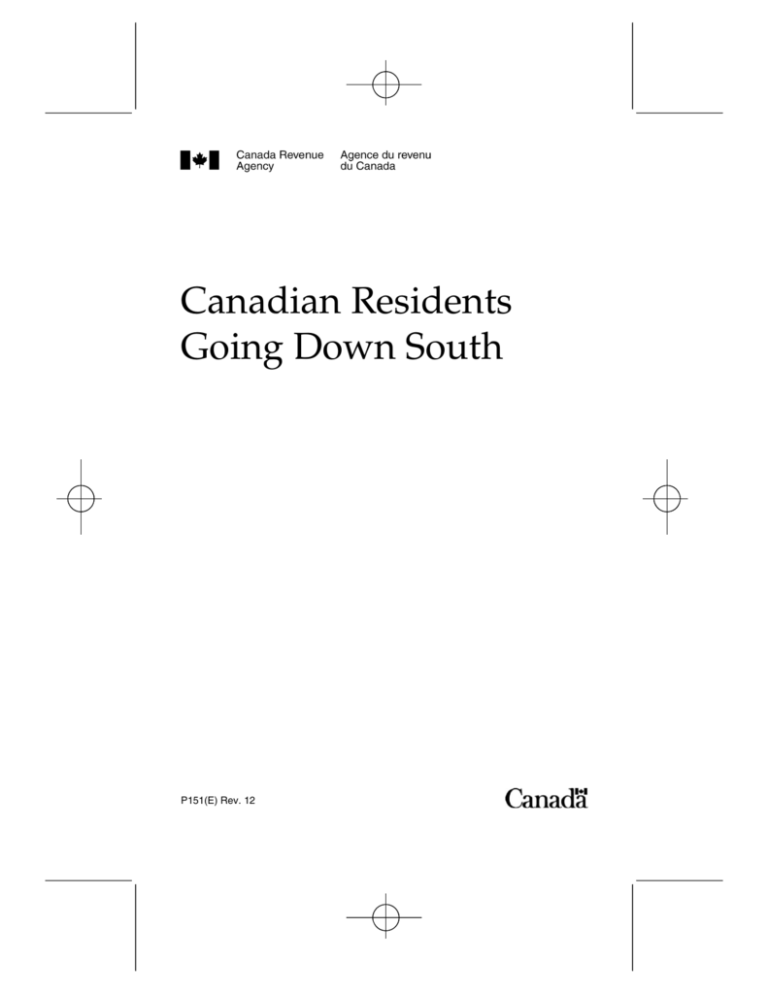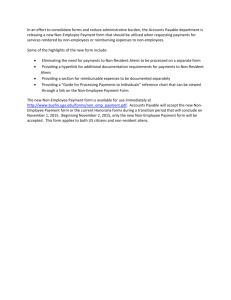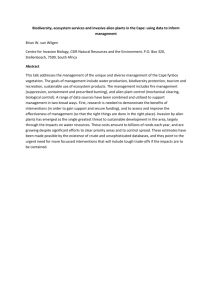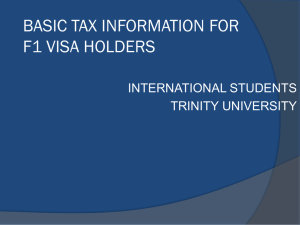P151 Canadian Residents Going Down South
advertisement

Canadian Residents Going Down South P151(E) Rev. 12 Is this pamphlet for you? T his pamphlet is for you if you spent part of the year in the United States (U.S.), for example, for health reasons or on vacation, and you still maintained residential ties in Canada. This pamphlet will give you information about certain income tax requirements that may affect you. It will also help you understand the U.S. tax laws that may apply to you. This pamphlet does not apply if you: ■ are a U.S. citizen; ■ have been granted permanent resident status by the United States Citizenship and Immigration Services (USCIS), (granted a “green card”); or ■ have residential ties to a country other than the U.S. and Canada. If you have a visual impairment, you can get our publications in braille, large print, etext, or MP3. For more information, go to www.cra.gc.ca/alternate or call 1-800-959-2221. If you are outside Canada and the United States, call us at 613-940-8495. We accept collect calls. La version française de cette publication est intitulée Résidents canadiens qui séjournent dans le Sud. www.cra.gc.ca Table of contents Page Before you start................................................................................ What are residental ties? ................................................................. 4 4 How Canadian income tax laws apply........................................ Completing your Canadian return ................................................ 4 5 Your provincial or territorial health-care coverage................... 8 How U.S. tax laws apply ................................................................ Are you a resident alien or a non-resident alien? ........................ Do you have to file a U.S. tax return? ........................................... Did you receive U.S. gambling or lottery winnings? .................. Do you own U.S. real property? .................................................... U.S. estate tax for non-resident aliens ........................................... Individual taxpayer identification number .................................. State and local taxes ......................................................................... Need more information from the Internal Revenue Service (IRS)? ................................................................................. 9 9 14 15 16 19 19 20 21 For more information ..................................................................... 22 What if you need help? ................................................................... 22 Forms and publications .............................................................. 22 My Account............................................................................... 22 Tax Information Phone Service (TIPS) ...................................... 22 Representative ......................................................................... 23 The Internal Revenue Service (IRS) of the Government of the United States of America provided information for the section called “How U.S. tax laws apply.” www.cra.gc.ca 3 Before you start What are residential ties in Canada? Residential ties in Canada include: ■ a home in Canada; ■ a spouse or common-law partner (see the definition in the General Income Tax and Benefit Guide) and dependants who stay in Canada while you are in the U.S.; ■ personal property, such as a car or furniture in Canada; and ■ social ties in Canada. Other relevant ties include a Canadian driver’s licence, Canadian bank accounts or credit cards, and medical insurance with a province or territory of Canada. How Canadian income tax laws apply I f you spend part of the year in the U.S., for example, for health reasons or on vacation, and you maintain residential ties in Canada, we usually consider you to be a factual resident of Canada. As a factual resident, we tax your income as if you never left Canada. As such, you should continue to: ■ report all income you receive from sources inside and outside Canada for the year, and claim all deductions that apply to you; ■ claim federal and provincial or territorial non-refundable tax credits that apply to you; ■ pay federal tax and provincial or territorial tax where you keep residential ties in Canada; 4 www.cra.gc.ca ■ claim federal and provincial or territorial refundable tax credits that apply to you; and ■ be eligible to apply for the goods and services tax/harmonized sales tax (GST/HST) credit and any related provincial credits. Completing your Canadian return As a factual resident, you will find most of the information you need to complete your return in the General Income Tax and Benefit Guide and the forms booklet for your province or territory. However, this pamphlet includes more information that will help you complete your return. If you are a factual resident of Canada, complete Form T1248, Information About Your Residency Status (Schedule D), and attach it to your return. Identification When you complete the “Identification” area on your return, do not enter a date of entry or departure. Only immigrants and emigrants use these spaces. If you enter a date of entry or departure, we may reduce your claim for federal and provincial or territorial non-refundable tax credits. On the line called “Enter your province or territory of residence on December 31, 2012”, enter the name of the province or territory where you maintained residential ties. Do you hold foreign property? You may have been in one of the following situations: ■ at any time in 2012, you owned or held foreign property with a total cost of more than CAN$100,000; ■ in 2012 or a previous year, you loaned or transferred funds or property to a non-resident trust; or ■ in 2012, you received funds or property from, or you were indebted to, a non-resident trust under which you were a beneficiary. www.cra.gc.ca 5 If you are in any of these situations, special rules may need to be applied. For more information, see your income tax guide. Income As a factual resident, you will continue to pay tax on your world income (income from all sources both inside and outside Canada) as though you had lived in Canada for the whole year. Report all amounts in Canadian dollars. Did you receive an NR4 or NR4-OAS information slip? An NR4 or NR4-OAS information slip shows income from Canada (such as old age security pension, Canada Pension Plan benefits, and Quebec Pension Plan benefits). If you receive this type of slip, report the income on your Canadian return. If the slip also shows that tax was withheld from the income, include it on line 437. Note As a factual resident, you should not receive slips that begin with NR. If you received an NR4 or NR4-OAS, contact the issuer of the slip to correct your residency information. Did you receive U.S. lottery or gambling winnings? This income is not taxable in Canada, so you do not have to report it on your Canadian return. Additionally, you cannot claim a credit for any taxes withheld on such winnings. For more information, see “Did you receive U.S. gambling or lottery winnings?” on page 15. Did you have rental income from property in the U.S.? If so, keep records to support your income and expense claims. For more information, see Guide T4036, Rental Income. Federal tax and credits To calculate your federal tax and the credits that apply to you, use Schedule 1, Federal Tax. 6 www.cra.gc.ca Federal non-refundable tax credits Can you claim medical expenses paid in the U.S.? You can claim eligible expenses that were paid for yourself, your spouse or common-law partner, and certain other individuals who were dependent on you for support. You can claim eligible medical expenses paid in any 12-month period ending in the year, if they were never claimed before in any other year. For more information, see lines 330 and 331 in your General Income Tax and Benefit Guide, or see Interpretation Bulletin IT-519, Medical Expense and Disability Tax Credits and Attendant Care Expense Deduction. Did you pay premiums to private health-services plans? Generally, you can claim the premiums paid to a private health-services plan as a medical expense on your return. For more information, see line 330 in your General Income Tax and Benefit Guide, or see Interpretation Bulletin IT-519, Medical Expense and Disability Tax Credits and Attendant Care Expense Deduction. Did you donate to U.S. charities? If you are including U.S. income on your Canadian return, you can claim a credit for donations to U.S. charities that would be allowed on a U.S. return. The total donations to U.S. charities you can claim cannot be more than 75% of the net U.S. income you report on your Canadian return. Can you claim a federal foreign tax credit? If you paid U.S. tax on U.S. income that you are reporting on your Canadian return, you may be able to claim a federal foreign tax credit to reduce your Canadian federal tax payable. For information on how to claim the foreign tax credit, see line 405 in your General Income Tax and Benefit Guide. For more information, see Form T2209, Federal Foreign Tax Credits, or Interpretation Bulletin IT-270, Foreign Tax Credit. www.cra.gc.ca 7 Note The province or territory where you maintained your residential ties may offer a similar tax credit. For more information, see the forms book for that province or territory. Provincial or territorial tax You have to pay tax to the province or territory where you maintained residential ties. Provincial or territorial non-refundable tax credits The province or territory where you maintained residential ties also offers non-refundable tax credits. For more information, see the forms book for that province or territory. Refund or balance owing Provincial or territorial tax credits For information about the credits available in the province or territory where you maintained residential ties and how to claim them, see the income tax guide and the forms book for that province or territory. Your provincial or territorial health-care coverage B efore you go to the United-States, you should verify if your provincial or territorial health-care coverage will continue while you are outside of Canada. In any case, you may want to get supplementary health-care coverage. For more information, contact the ministry responsible for health care in your province or territory. See the provincial or territorial government listings in your Canadian telephone book for the address and telephone number of your provincial or territorial ministry of health office. 8 www.cra.gc.ca How U.S. tax laws apply A s a Canadian resident who spends part of the year in the U.S., you are considered either a resident alien or a non-resident alien of the U.S. for U.S. tax purposes. Generally, resident aliens are taxed in the U.S. on income from all sources inside and outside the U.S., and non-resident aliens are taxed in the U.S. only on income from U.S. sources. Therefore, it is important for you to determine if you are a resident alien or a non-resident alien. Are you a resident alien or a non-resident alien? To determine if you are a resident alien or a non-resident alien of the U.S. for tax purposes, you first need to know if you meet the substantial presence test. Do you meet the substantial presence test? This test uses the number of days you were in the U.S. during a three-year period (the current and the two previous years) to determine if you are a resident alien or a non-resident alien. To meet this test for the 2012 tax year, you must be physically present in the U.S. for more than: ■ 30 days during 2012; and ■ 182 days during the three-year period based on the following calculation: – count each day in 2012 as one full day; – count each day in 2011 as one-third of a day; and – count each day in 2010 as one-sixth of a day. Note The days do not have to be consecutive, and you are treated as being present in the U.S. on any day you were there for part or all of the day. Certain days spent in the U.S. do not count for the substantial presence test. For more information, go to www.cra.gc.ca 9 www.irs.gov/taxtopics/tc851.html, or read Chapter 1 of Internal Revenue Service (IRS) Publication 519, U.S. Tax Guide for Aliens. Example Florence and Henry are residents of Canada and own a trailer home in Florida, where they spend each winter. Although they have no U.S. source income, they need to determine their U.S. residency status. As part of this determination for 2012, they need to see if they meet the substantial presence test by calculating how many days they were in the U.S. during 2012, 2011, and 2010. During 2012, they were in the U.S. from January 1 to April 11, and from November 13 to December 31 (151 days). During 2011, they were in the U.S. from January 1 to March 31, and from November 14 to December 31 (138 days). During 2010, they were in the U.S. from January 1 to April 5, and from November 1 to December 31 (156 days). Each day they were in the U.S. during 2012 counts as a full day (151). Each day they were in the U.S. during 2011 counts as one-third of a day (138 × 1/3 = 46). Each day they were in the U.S. during 2010 counts as one-sixth of a day (156 × 1/6 = 26). They add the subtotals: 151 + 46 + 26 = 223. Since the total is more than 182 days, they meet the substantial presence test and are considered resident aliens for 2012. If you meet the substantial presence test, you will be considered a resident alien for 2012. Note Even if you are considered a resident alien, you may still be treated as a non-resident alien for U.S. tax purposes. For more information, see “Do you have a closer connection to Canada” on the next page and “Are you a Canadian resident under the treaty” on page 13. If you do not meet the substantial presence test, you will be considered a non-resident alien for 2012. If this is your situation, read “Do you have to file a U.S. tax return?” on page 14. 10 www.cra.gc.ca Do you have a closer connection to Canada? Even if you are a resident alien because you meet the substantial presence test, you can still be treated as a non-resident alien if: ■ you were present in the U.S. for less than 183 days in 2012; ■ your tax home is in Canada (see “What is a tax home?” on this page); ■ you had a closer connection to Canada than to the U.S. during 2012 (see “How do you determine a closer connection to Canada?” on this page”); and ■ you filed Internal Revenue Service (IRS) Form 8840, Closer Connection Exception Statement for Aliens, by June 17, 2013 (see “How do you advise the IRS about your closer connection to Canada?” on the next page). If you have determined that you are a non-resident alien, see “Do you have to file a U.S. tax return?” on page 14. What is a tax home? If you are employed or self-employed, your tax home is the location of your principal place of business or employment, regardless of where you maintain your family home. If you are not employed or self-employed, or are employed or self-employed but do not have a principal place of employment or business, your tax home is where you regularly live. It can be a house, an apartment, or a furnished room, which you own or rent. It must have been available to you continuously at all times throughout 2012, and not just for short stays during the year. How do you determine a closer connection to Canada? You are considered to have a closer connection to Canada than to the U.S. if you maintain more significant ties to Canada. Significant ties include the location of the following: ■ your permanent home and business activities; ■ your family; www.cra.gc.ca 11 ■ personal belongings such as cars, furniture, clothing, and jewellery; ■ social, political, cultural, or religious organizations to which you belong; ■ the jurisdiction where you vote; and ■ the jurisdiction where you hold a driver’s licence. If you have applied to the U.S. Citizenship and Immigration Services for Lawful Permanent Resident status in the U.S. (applied for a “green card”), or you have been granted permanent residency status (granted a “green card”), you will not be eligible to claim the closer connection exception. How do you advise the Internal Revenue Service about your closer connection to Canada? You have to file Internal Revenue Service (IRS) Form 8840, Closer Connection Exception Statement for Aliens, to advise the IRS that your tax home is in Canada and that you maintained more significant ties in Canada than in the U.S. during 2012. We have included a copy of the form in the middle of this pamphlet. If you have to file a U.S. income tax return for 2012, attach Form 8840 to it. If you do not have to file a return, send Form 8840 by June 17, 2013, to: Department of the Treasury Internal Revenue Service Center Austin TX 73301-0215 USA Each individual claiming the closer connection exception has to file Form 8840. If your spouse or any of your children want to claim the closer connection exception, they also have to file Form 8840. Note If you do not file Form 8840 by June 17, 2013, you will not be eligible to claim the closer connection to Canada for 2012. You will, therefore, be treated as a resident alien for U.S. tax purposes. However, if you could not comply with this filing 12 www.cra.gc.ca requirement for a valid reason, attach an explanation of the reason to Form 8840 when you file it. Example Florence and Henry have determined that they are resident aliens for 2012 because they meet the substantial presence test. However, they file Canadian returns as residents of Canada, and their family, belongings, and permanent home are in Canada. They also maintain social and religious ties in their home town in Canada. Since Florence and Henry have closer ties to Canada than to the U.S., and they were present in the U.S. for less than 183 days during 2012, they may be treated as non-resident aliens for U.S. tax purposes under the closer connection exception. Florence and Henry each have to submit Form 8840 by June 17, 2013, to advise the IRS of their closer connection to Canada. If they do not file it on time, they will not be eligible for this exception and they may be subject to U.S. income tax on their income from all sources inside and outside the U.S. You have to file a new Form 8840 for each tax year for which you want to claim the closer connection exception. Are you a Canadian resident under the treaty? If you are a resident alien because you met the substantial presence test, but you cannot claim the closer connection exception, you might still be able to be treated as a non-resident alien for U.S. tax purposes under Article IV of the Canada-United States Income Tax Convention if you have a permanent home in Canada. If you also have a permanent home in the U.S., you may be treated as a non-resident alien if your personal and economic ties are closer to Canada than to the U.S. For more information, see Chapter 9 of Publication 519, U.S. Tax Guide for Aliens. If you are claiming to be a resident of Canada under Article IV of the Canada-United States Income Tax Convention, you should complete and attach Form 8833, Treaty-Based Return www.cra.gc.ca 13 Position Disclosure Under Section 6614 or 7701(b), to your U.S. income tax return. Additional information on U.S. residency rules If you need more information on residency status rules in the United States, go to www.irs.gov/taxtopics/tc851.html, or read Chapter 1 of Internal Revenue Service (IRS) Publication 519, U.S. Tax Guide for Aliens. Do you have to file a U.S. tax return? Resident aliens Generally, resident aliens have to file a U.S. tax return to report income from all sources inside and outside the U.S. for the year if their annual gross income exceeds certain U.S. dollar amounts. For more information, see the section called “Filing Requirements” in the instructions for Form 1040. If you are a resident alien who cannot be considered a non-resident alien under the closer connection exception or under Article IV of the Canada-U.S. Income Tax Convention, you should file Form 1040 as a resident alien if you meet the filing requirements described in the Form 1040, Instructions. Non-resident aliens If you are a non-resident alien, your income that is subject to U.S. income tax is divided into two categories: ■ income that is effectively connected with a trade or business in the U.S. (including income from the sale or exchange of U.S. real property); and ■ income that is not effectively connected with a trade or business in the U.S., but is from U.S. sources (including interest, dividends, rents, and annuities). Effectively connected income, after allowable deductions, is taxed at the same rates that apply to U.S. citizens and residents. Income that is not effectively connected is taxed at 30% or a lower tax treaty rate. 14 www.cra.gc.ca As a non-resident alien, you have to file a 2012 U.S. tax return (Form 1040NR) by June 17, 2013, if: ■ you are engaged in a trade or business which would produce income that is effectively connected (even if you had no income in the tax year from that trade or business); ■ you have U.S. source wage income which is greater than one personal exemption for the tax year; or ■ you have income that is not effectively connected and that did not have sufficient tax withheld at source. If you have income that is not effectively connected and had too much tax withheld at source, you should file a U.S. tax return to claim a refund of the overpaid tax. You have to file your U.S. return by April 15, 2013, if you were an employee in the U.S. and received wages subject to withholding. If you are not able to file your U.S. return by the due date, submit Form 4868 for an automatic extension of time to file: ■ until October 15, 2013 if you are required to file your return by April 15, 2013; or ■ until December 16, 2013 if you are required to file Form 1040NR by June 17, 2013. Note Form 4868 does not extend the time to pay any tax due. For more information, see IRS Publication 519, U.S. Tax Guide for Aliens, or contact the IRS at the address and telephone number shown on page 21 of this pamphlet. Did you receive U.S. gambling or lottery winnings? As a non-resident alien, you are subject to tax on gross U.S. gambling or lottery winnings at the rate of 30% at the time of winning. However, nonbusiness winnings from blackjack, baccarat, craps, roulette, and Big-6 wheel are exempt from tax. www.cra.gc.ca 15 If you received tax-exempt winnings, or if the correct amount of tax was collected at the time of winning, you do not have to file a U.S. tax return if this is your only U.S. income. Under the Canada-U.S. Income Tax Convention, you can claim your U.S. gambling losses up to the amount of your U.S. gambling winnings for the year using the same rules that apply to U.S. citizens and residents. To claim a refund of taxes withheld from gambling winnings, you must file Form 1040NR, U.S. Nonresident Alien Income Tax Return. Since proceeds from blackjack, baccarat, craps, roulette, and Big-6 wheel are exempt from tax, you cannot claim any losses you incur from wagering on these games. Be sure to keep an accurate record of your U.S. gambling losses and winnings. Do you own U.S. real property? If you own U.S. real property, such as a condominium or house, you should be aware of the tax consequences of renting out or selling U.S. real estate. Did you receive rental income from this property? As a non-resident alien, you are subject to U.S. income tax on rental income you receive from U.S. real property. You are considered to have received the income from a U.S. source, even if it was paid to you while you were in Canada. Rental income is not effectively connected with the conduct of a U.S. trade or business and, as such, is subject to a 30% tax on the gross income, with no expenses or deductions allowed. However, under the Internal Revenue Code, you can elect to treat rental income as income that is effectively connected with the conduct of a U.S. trade or business. If you make this election, you are taxed on your net income from the property. You can claim expenses related to owning and operating the rental property during the rental period, including a mandatory depreciation charge. 16 www.cra.gc.ca To make this election, attach a letter to Form 1040NR, U.S. Nonresident Alien Income Tax Return, stating that you are making the election and whether the choice is under Internal Revenue Code Section 871(d) or a tax treaty. Include the following information: ■ a complete list of all your real property located in the U.S.; ■ the location of all your real property in the U.S.; ■ the extent of your ownership in the property; ■ a description of any major improvements to the property; ■ the dates you owned the property; ■ your income from the property; and ■ a list of any previous taxable years for which you made an election, or revocation, to treat U.S. real property income as effectively connected with a U.S. trade or business. The choice stays in effect for all later tax years unless you revoke it. For more information on this election, see IRS Publication 519, Tax Guide for Aliens, under the section called “Income from Real Property.” For information on rental income and expenses, get IRS Publication 527, Residential Rental Property (Including Rental of Vacation Homes). If you have not made an election to treat your U.S. rental property income as effectively connected with a U.S. trade or business, then tenants or management agents (withholding agents) have to withhold a 30% non-resident tax from the gross rent and send it to the IRS using Form 1042, Annual Withholding Tax Return for U.S. Source Income of Foreign Persons, and Form 1042-S, Foreign Person’s U.S. Source Income Subject to Withholding. www.cra.gc.ca 17 If you want to be exempt from the 30% non-resident withholding tax and are making the election to treat the U.S. rental properties as effectively connected with a U.S. trade or business, you have to give the tenant or management agent Form W-8ECI, Certificate of Foreign Person’s Claim That Income Is Effectively Connected With the Conduct of a Trade or Business in the United States. For more information about U.S. withholding taxes, see IRS Publication 515, Withholding of Tax on Nonresident Aliens and Foreign Entities. Did you dispose of U.S. real estate? As a non-resident alien, gains or losses you have from disposing of U.S. real property interests are considered to be effectively connected with a U.S. trade or business. If you sell or otherwise dispose of U.S. real estate, the purchaser, or his or her agent, is generally required to withhold 10% of the gross sale price at the point of sale. However, there are exceptions to this rule. For more information, see the section called “U.S. Real Property Interest” in IRS Publication 515, Withholding of Tax on Nonresident Aliens and Foreign Entities. You then have to file Form 1040NR, U.S. Nonresident Alien Income Tax Return, and the required schedules, to report the gain or loss. If you own the real property with another person such as your spouse, each of you has to file a Form 1040NR. Stock in a U.S. corporation or an interest in a partnership may be treated the same as direct ownership of U.S. real estate if the corporation owns a certain amount of U.S. real estate or if the partnership owns U.S. real estate. For more information about gains and losses from the sale of U.S. real property, see the section called “Real Property Gain or Loss” in IRS Publication 519, U.S. Tax Guide for Aliens. 18 www.cra.gc.ca U.S. estate tax for non-resident aliens The U.S. imposes an estate tax on the transfer of a deceased person’s taxable estate. The taxable estate of a Canadian non-resident alien includes the following assets located in the U.S.: ■ real estate and tangible personal property; ■ stock in a U.S. corporation; and ■ debt issued by, or enforceable against, a U.S. entity (but most corporate debt instruments issued after 1984 are exempt from U.S. estate tax). The U.S. estate tax is based on the fair market value of the asset on the date of death, so there is no impact from a profit or loss because of a deemed disposition on the date of death. Non-resident aliens cannot claim foreign tax credits on a U.S. estate tax return for deemed-disposition capital gains income taxes paid to Canada. For the transfer of a decedent’s U.S. assets, the IRS requires Form 706NA, United States Estate (and Generation-Skipping Transfer) Tax Return, if the value of the U.S. assets exceeds $60,000 on the date of death. For more information, see Form 706NA and instructions from the IRS. You will find the address and telephone numbers of the IRS on page 21. Individual taxpayer identification number If you have to file a U.S. tax return, you must use a U.S. taxpayer identification number. Generally, this is a social security number issued by the United States. If you don’t have a U.S social security number and you are ineligible to apply for one, you must use an IRS individual taxpayer identification number (ITIN). www.cra.gc.ca 19 Notes Do not use your Canadian social insurance number to file your U.S. tax return. If you were issued a U.S. temporary identification number by the IRS for a tax year before 1996, you can no longer use that number and must apply for an ITIN. An ITIN is for tax purposes only and is not a confirmation that you can work or live in the U.S. To apply for an ITIN, you must complete IRS Form W-7, Application for IRS Individual Taxpayer Identification Number, and attach it to your U.S. tax return. For more information, go to www.irs.gov/individuals/article/0,,id=96287,00.html. State and local taxes You may be required to file a state or local income tax return for the state or city you were in while visiting the United States. Different states and cities have different filing requirements. For more information, contact the state or city authorities where you stayed. For more information on state and local taxes in the United States, go to www.statelocalgov.net. 20 www.cra.gc.ca Need more information from the Internal Revenue Service (IRS)? While you are in Canada, if you need more information about U.S. tax laws or tax-filing procedures, write to: Internal Revenue Service P.O. Box 920 Bensalem PA 19020 USA You can also call or fax the Philadelphia Service Center office: Tel: 267-941-1000 (not toll-free) Fax: 267-941-1055 Telephone service is from 6:00 am to 11:00 pm (Eastern time) Monday to Friday. If you want to order IRS forms or publications you may call 1-800-829-3676 or write to: Internal Revenue Service 1201 N. Mitsubishi Motorway Bloomington IL 61705-6613 USA If you are in the U.S., contact the IRS office in your area. A list of local IRS offices can be found at www.irs.gov/localcontacts. You can get IRS forms, publications, and tax information at www.irs.gov/formspubs. You can find U.S. tax information for foreign nationals at www.irs.gov/businesses/small/international. You can send tax questions to the IRS by email at www.irs.gov/help/page/0,,id=133197,00.html. www.cra.gc.ca 21 For more information What if you need help? I f you need more information after reading this pamphlet, visit www.cra.gc.ca or contact us. You will find the address and telephone numbers on the back cover of this pamphlet. Forms and publications To get our forms and publications go to www.cra.gc.ca/forms or call 1-800-959-2221 (from Canada and the U.S.). My Account My Account is a secure, convenient, and time-saving way to access and manage your tax and benefit information online, seven days a week! You can now use your online Canadian banking information to log in to My Account. You can still use your CRA user ID and password, if you prefer. Discover all that My Account has to offer you. Take the tour at www.cra.gc.ca/myaccount. Tax Information Phone Service (TIPS) For personal and general tax information by telephone, use our automated service, TIPS, by calling 1-800-267-6999 (from Canada and the U.S.). 22 www.cra.gc.ca Representative You can authorize a representative (such as your spouse or common-law partner, tax preparer, or accountant) to get information about your tax matters and give us information on your behalf. We will accept information from and/or provide information to your representative only after we are satisfied that you have authorized us to do so through My Account (www.cra.gc.ca/myaccount), in writing or by sending Form T1013, Authorizing or Cancelling a Representative. Your authorization will stay in effect until you cancel it, it reaches the expiry date you choose, or we receive notification of your death. www.cra.gc.ca 23 p151-12e.docxp151-12e.docx 2012-10-11 1:56 PM To contact us By telephone Calls from Canada and the U.S. .................................. 1-855-284-5942 Fax number ....................................................................... 613-941-2505 Regular hours of service Monday to Friday (holidays excluded) 8:15 a.m. to 5:00 p.m. (Eastern time) Extended hours of service From February 18 to April 30, 2013 (except Easter weekend) From 8:15 a.m.to 9:00 p.m., Eastern time, on weekdays From 9:00 a.m. to 5:00 p.m., Eastern time, on Saturdays By mail International Tax Services Office Post Office Box 9769, Station T Ottawa ON K1G 3Y4 CANADA If you have questions about your U.S. income tax affairs, please contact the IRS. You will find the address, telephone number, and Web site addresses of the IRS on page 21. Your opinion counts If you have comments or suggestions that could help us improve our publications, send them to: Taxpayer Services Directorate Canada Revenue Agency 395 Terminal Avenue Ottawa ON K1A 0S5 CANADA






